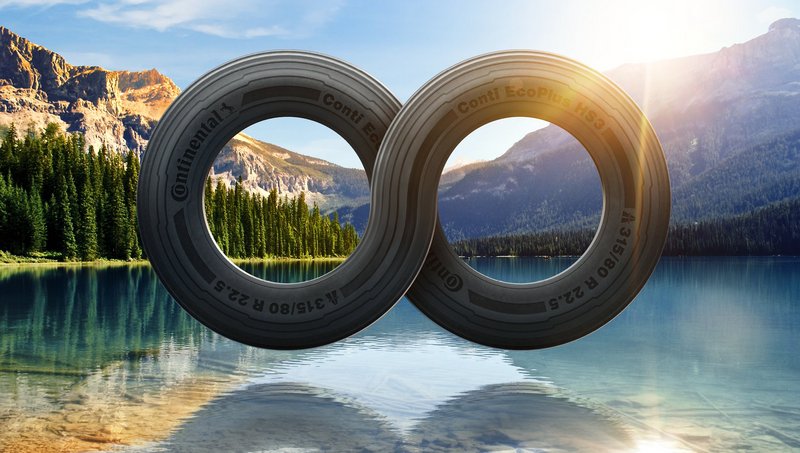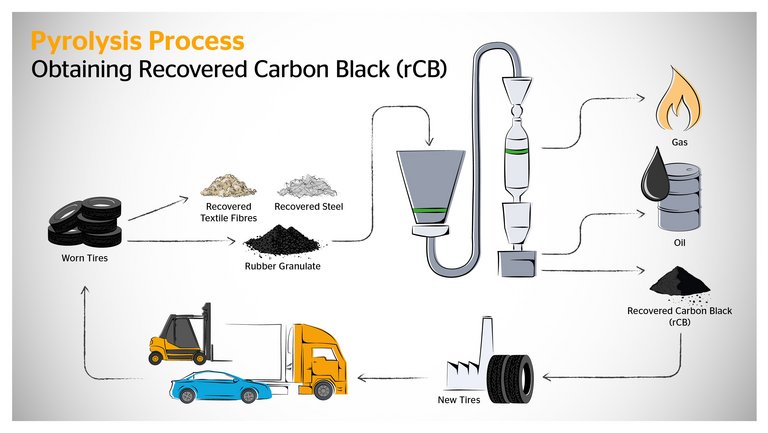Continental to Further Increase the Recycling Share in its Tires
- Ten years purchase agreement concluded with Pyrum Innovations for recovered carbon black from end-of-life tires
- Long-term goal: Closed-loop recycling management concept for end-of-life tires
- Continental has set itself the goal of using more than 40 percent renewable and recycled materials in its tires by 2030
Hanover, Germany, July 30, 2024. Continental has concluded a long-term purchase agreement with Pyrum Innovations, a specialist in the thermolysis technology of end-of-life tires, for particularly high-quality carbon black (rCB) recovered from end-of-life tires. Continental intends to use recovered carbon black in the series production of passenger car tires in the future. The two companies are thus intensifying their cooperation. The premium tire manufacturer had already signed a development agreement with Pyrum Innovations in 2022. Since then both companies share the common goal to further optimize and expand the recycling of end-of-life tires through pyrolysis.
Carbon black is an important raw material both for tire production and for the manufacture of other industrial rubber products. The use of carbon black in rubber compounds increases the stability, strength and durability of tires. Carbon black recovered from end-of-life tires helps reduce the use of fossil raw materials and CO2 emissions. In a passenger car tire from Continental, the soot content, giving the tire its black color, is between 15 and 20 percent, depending on the model. By using recycled carbon black, Continental is one step closer to its goal of using more than 40 percent renewable and recycled materials in its tires by 2030.
"Recycled raw materials are becoming increasingly important in our tire production. To further increase the circularity of our products, we need to think differently. We need to move from an "end-of-life" to an "end-of-use" tire concept. This means that the end of a tire's intended use phase must become the beginning of a new opportunity. Together with Pyrum, we are developing highly efficient processes to recycle as many components and materials as possible from an end-of-use tire back into our production cycle," says Jorge Almeida, Head of Sustainability Continental Tires.
Continental tires already contain recycled materials such as recycled rubber from mechanically processed end-of-life tires, recycled steel and recycled polyester from PET bottles, which otherwise often end up in incinerators or landfills.
Tire recycling requires advanced technologies and processes to efficiently separate, clean and recycle materials without compromising the safety and quality of the recycled tires or recycled materials. Safety is Continental's top priority.
Recycling management concept: End-of-life tires become raw material for new tires
The premium tire manufacturer previously concluded a development agreement with Pyrum Innovations in 2022. "The expansion of our cooperation with Continental is a very important step for us," says Pascal Klein, CEO Pyrum Innovations. He adds: "To ensure that Continental can also use our recovered carbon black in the series production of passenger tires in the future, we are continuously working on its further development as part of a development partnership. Together, we have already succeeded in ensuring that all newly produced forklift tires at the Continental tire plant in Korbach, Hesse, contain our sustainable carbon black."
Circular economy an integral part of Continental's sustainability strategy
As part of its ambitious sustainability strategy, Continental aims to increase the use of sustainable materials in its tires to 100 percent by 2050 at the latest. Recycled materials will make an important contribution. As part of a closed-loop system, end-of-life tires will become the raw material for new tires in the future.

Laura Averbeck
Communications Manager Sustainability
Continental Tires

Henry Schniewind
Head of External Communications
Continental Tires



